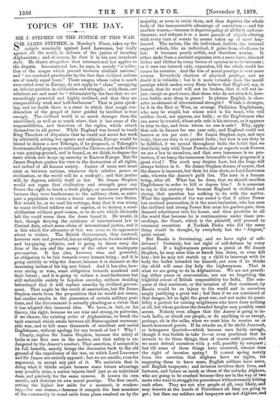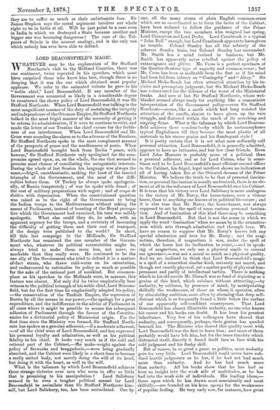TOPICS OF THE DAY.
SIR J. STEPHEN ON THE JUSTICE OF THIS WAR.
SIR JAMES STEPHEN, in Monday's Times, takes up the cudgels nominally against Lord Lawrence, but really against all the world, in defence of the justice of invading Afghanistan ; and of course, he does it in his own trenchant style. He denies altogether that international law applies to the dispute. International law, he says, is merely "a collec- tion of the usages which prevail between civilised nations," and "are rendered practicable by the fact that civilised nations are of nearly equal force." Those usages, whose value is much over-rated even in Europe, do not apply to " clans " occupying an inferior position in civilisation and strength ; with them, our relations are and must be "determined by the fact that we are exceedingly powerful and highly civilised, and that they are comparatively weak and half-barbarous." That is plain speak- ing, and no doubt there is a sense in which that rough con- densation of the gospel of force guided by intellect is true enough. The civilised world is so much stronger than the uncivilised, as well as so much wiser, that it has some of the responsibilities, and therefore of the rights, which attach themselves to all power. While England was bound to teach King Theodore of Abyssinia that he could not arrest her work by arbitrarily seizing her agents and subjects, Europe would be bound to depose a new Tchengis, if he proposed, as Tchengis's lieutenants did propose, to extirpate the Chinese, and make China a vast grazing-ground, and is bound, as we think, to depose the caste which now keeps up anarchy in Eastern Europe. But Sir James Stephen pushes his view to the destruction of all rights, and indeed of all human society. Justice of some sort must exist as between nations, whatever their relative power or civilisation, or the world will be a cock-pit ; and that justice will, by degrees, solidify itself as law. Sir James Stephen would not argue that civilisation and strength gave any Power the right to break a fresh pledge, or massacre prisoners because they were burdensome to the military chest, or extir- pate a population to create a desert zone between two States. Nor would he, as we read his writings, deny that it was wrong to waste civilised soldiers out of caprice, or to destroy a semi- civilisation without good reason, or to do acts which obviously left the world worse than the doers found it. He would, in fact, though denying the existence of international law in Central Asia, admit some claim of international justice, and it is this which the advocates of this war seem to its opponents about to violate. The British Government, they contend, however wise and powerful, has an obligation to its own soldiers and tax-paying subjects, and is going to throw away the lives of the one and the money of the other on inadequate provocation. It has also, however wise and powerful, an obligation to be fair towards every human being ; and it is going unfairly to whip the Ameer, because it is alarmed at the increasing inches of his big new friend. And it has also, how- ever strong or wise, some obligation towards mankind and their future ; and it is going to reduce a semi-barbarous but still endurable society to hopeless anarchy, without deciding beforehand that it will replace anarchy by civilised govern- ment. That might be the result of annexation, but Sir James Stephen starts from the proposition that he would not annex, but confine results to the possession of certain military posi- tions, and the Government is actually pleading as a virtue that it has adopted this immoral idea. We have, in fact, on his theory, the right, because we are wise and strong, to pulverise, if we choose, the existing order of Afghanistan, to break the tacit contract which exists between all States against unreason- able war, and to kill some thousands of excellent and useful Englishmen, without apology for any breach of law ? Why ? Clearly, replies Sir James Stephen, because the safety of India is our first care in the matter, and that safety is en- dangered by the Ameer's conduct. That assertion, if accepted in its full breadth, merely brings the discussion back to the old ground of the expediency of the war, on which Lord Lawrence and Sir James are entirely opposed ; but we are unable, even for argument, to accept any part of it. We maintain that in doing what it thinks unjust because some future advantage may possibly arise, a nation injures itself just as an individual does, and precisely for the same reasons. It lowers its own morale, and destroys its own moral prestige. The first result, setting the higher law aside for a moment, is weaken- ing,—for one reason,—because it compels the best members ' of the community to stand aside from plans resolved on by the majority, or even to resist them, and thus deprives the whole body of the immeasurable advantage of conviction ;—and for another reason,—because it deprives policy of all fixity and con- tinuance, and reduces it to a mere pursuit of objects altering with every turn of events by means taken up at mere hap- hazard. The nation, like the individual, forfeits the internal support which, like an individual, it gains from obedience to law. It becomes purely selfish, and therefore unwise. It either sinks from a sentient organism into a mere force, directed hither and thither by every breeze of opinion as to its interests ;- or it sees one interest only, expansion, till the whole world be- comes its enemies. And the loss of moral prestige is even more serious. Everybody chatters of physical prestige, and no doubt it is valuable ; but is it more valuable than the moral prestige which makes every State believe that England, say, is honest, that its word will not be broken, that it will not in- jure except on good cause, that those who do not attack it, how- ever feeble, may sleep in peace ? In plainer English, is char- acter no element of international strength ? Which is stronger, be it in the East or West, an average Philistine Englishman, who may be stupid, but whose word is his bond, who will neither cheat, nor oppress, nor bully ; or the Englishman who can never be trusted, whose sole rule is his interest, as it appears to him to-day, and from whom no one is safe ? Why, apply that rule in finance for one year only, and England could not borrow at ten per cent. I Sir James Stephen says, and says truly, that our duty is to protect India ; but how is our duty to be fulfilled, if we spread throughout India the belief that we deal fairly only with Great Powers, that as regards weak Powers we are a law to ourselves, and that even innocence is no pro- tection, if we fancy the innocence favourable to the progress of a great rival ? The stork may despise Law, but the frogs will always believe in it. Sir James Stephen denies, of course, that the Ameer is innocent, but then let him show, as Lord Lawrence asks, wherein the Ameer's guilt lies. The man is a human being, after all. What has he done, that we should sacrifice Englishmen in order to kill or depose him ? It is nonsense to say in this century that because England is civilised and strong, that question has nothing to do with the matter. What the opponents of the war assert is that if either Power has received provocation, it is the semi-barbarian, who has seen the civilised and strong Power first seize his garden-gate, then demand admittance into his house, and then proclaim to all the world that because he is contumacious under those pro- ceedings, the Court, which is the plaintiff, will proceed to summary execution. A Turkish Pasha who did the same thing would be thought, by everybody but the "Jingoes,' quite unjust.
But Russia is threatening, and we have right of self- defence ? Certainly, but not right of self-defence by every method. If a highwayman presents a pistol at Sir James Stephen, he may seize him or knock him down, or even kill him ; but he may not snatch up a child to intercept with its body the bullet intended for himself, not even if he thinks the child will some day help the highwayman. That is what we are going to do in Afghanistan. We are not preach- ing either peace or over-caution, nor are we forgetting the frightful extent of British responsibility for India. The con- quest of that continent, or the invasion of that continent, by Russia would be an injury to the world and to ourselves amply justifying a great war ; but then if we are convinced of that danger, let us fight the great war, and not make its possi- bility a pretext for ruining neighbours who have done nothing at all, but whose gardens the dreaded burglar may possibly come across. Nobody even alleges that the Ameer is going to in- vade India, or attack our people, or do anything to us except, perhaps, sit in the sulks, when we want him to receive us as much-honoured guests. If he attacks us, if he shells Jumrood, or beleaguers Quettah—which became ours fairly enough, though it was foolish to take it—or even proclaims that he intends to do these things, then of course cadit qucestio, and we must defend ourselves with a will, possibly by conquest ; but till some of these things have occurred, whence does the right of invasion spring ? It cannot spring merely from the assertion that Afghans have no rights, for supposing them to have none, English soldiers have some, and English taxpayers ; and invasion involves their lives, and fortunes, and future as much as those of the unlucky Afghans, who are going to be crushed because they are in the way of two mobs who want to struggle for precedence without exactly hitting each other. They are not nice people at all, very likely, and may deserve at the hands of Providence all they are going to get ; but then our soldiers and taxpayers are not Afghans, and they are to suffer as much as their unfortunate foes. Sir James Stephen says the moral argument involves our whole right to be in India at all. Will he just point to a case even in India in which we destroyed a State because another and bigger one was becoming dangerous The case of the Tal- poors of Scinde is the nearest analogy, and is the only one which nobody has ever been able to defend.



































 Previous page
Previous page